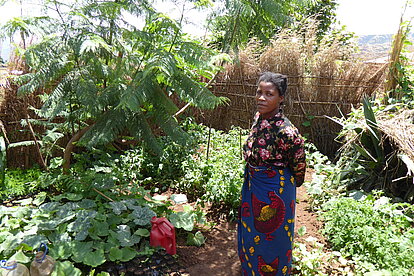Malawi
Health Care in East Africa
In the East African country of Malawi, most of the inhabitants live on agriculture and suffer from the extreme consequences of climate change. Almost half of the population has no clean drinking water and there is a lack of basic sanitation. Diarrhoeal diseases, HIV and AIDS as well as malaria, but also chronic diseases and mental illnesses are on the rise. DIFÄM and its partner organisations actively involve the local communities in Malawi in the improvement of their health situation.
Breaking new ground together

In Malawi in south-eastern Africa, most of the approximately 16 million inhabitants practise small-scale agriculture and live mainly from what they grow themselves. Many have less than one euro per day to live on. But in recent years, extreme droughts and floods have destroyed entire harvests. Many families are starving. Rising prices for basic foods are also a burden on the poorer population.
Especially in the rural regions of the country, only a few doctors are practising and there is a lack of medicines, medical equipment and electricity. Almost half of the population does not get clean drinking water and there is a lack of sanitary facilities - with fatal consequences: Many people, especially small children, suffer from diseases caused by contaminated water. HIV and AIDS as well as malaria still play a major role and chronic diseases and mental illnesses are also on the rise.
Sustainably improve health in the villages
Together with the Nkhoma Mission Hospital of the Presbyterian Church, we are breaking new ground in Malawi to sustainably improve health in the villages: In the ASSET project, we focus on the strengths and assets of the people. Women, men and young people in the communities are actively involved in improving their own health situation. And they themselves decide which are their most serious health problems, which ones they want to tackle first, and what they have at their disposal to do so. The improvement of sanitary conditions, the enhancement of the nutritional situation as well as the care for people with mental illnesses were their most pressing issues.
For the local people, this approach is new. "Until now, we were used to organisations coming from outside to improve things in our village," one villager says. "Now we see that we can contribute a lot ourselves in order to change our situation in the long term." Thus, people's living conditions are gradually improving without the need to create new dependencies on foreign support.
Relief in the refugee camp
In the Dzaleka refugee camp, Difäm is working with Herrnhuter Missionshilfe (Moravian Health and Development Services) to improve the health situation for the refugees.
What to know about Malawi
- Malawi is located in south-east Africa. It is one of the poorest countries in the world.
- Maternal mortality rates in Malawi are among the world's highest.
- Around half of the population has no access to clean drinking water and sanitation. This is dangerous and makes people sick: not only diarrhoeal diseases, but also skin and eye diseases and parasites are the result. Hundreds of children die every year from diseases caused by a lack of water, sanitation and hygiene.
- The climate crisis affects Malawi: extreme weather occurs more frequently and with greater intensity.
- Cyclones destroy vital infrastructure. Floods and droughts cause crop failures. The food crisis is noticeable throughout the country.


